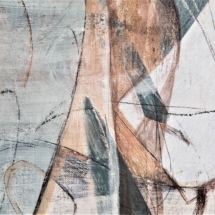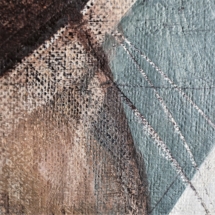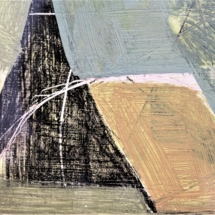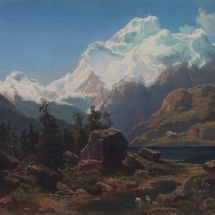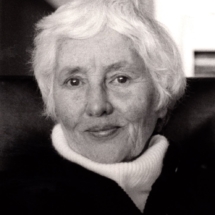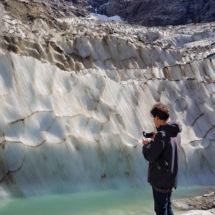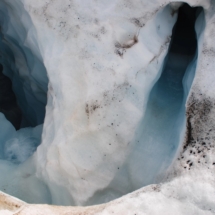In 1949 a Scottish woman climbed a mountain that changed her life….
This Autumn, Mark Cousins brings a new immersive installation to the Fruitmarket, Edinburgh. Like A Huge Scotland tells the story of a day of great inspiration in the life of Scottish artist, Wilhelmina Barns-Graham (1912–2004) in an intense visual and surround-sound experience. It takes place from 5 to 27 November in the gallery’s Warehouse space.
In 1949 Wilhelmina Barns-Graham walked to the Grindelwald glacier in Switzerland with some friends. As they picked their way across the frozen sea of ice and rock, she had an epiphany and later produced an extraordinary cycle of paintings inspired by what she had seen. More than 70 years after Barns-Graham, Mark Cousins climbed the same glacier filming what he saw – the glacier has retreated by a mile and is almost gone. Like A Huge Scotland is a moving, angry elegy for a glacier that has disappeared due to global warming, and a passionate tribute to a great artist: Wilhelmina Barns-Graham.
Mark Cousins said: Wilhelmina Barns-Graham was a brilliant, free-thinking 20th Century artist. My work, Like Huge Scotland, is electrified by her paintings in the way she was electrified by a climb up to a glacier in the Alps in May 1949.
In the Fruitmarket, with composer Linda Buckley and sound designer Ania Przygoda, I will plunge people into the feeling of being inspired, of looking anew, of having your brain changed. What does inspiration feel like? What happened to Barns-Graham on that day?
Shot on 8K cameras, the large-scale, enveloping, four-channel installation, Like A Huge Scotland casts a forensic eye on Barns-Graham’s glacier paintings, enlarging details to 10,000 times their original size to reveal their almost molecular structure, alongside footage of the glacier filmed on a recent trip.The installation is peppered with voice, a young Wilhelmina in discussion with her older self, reflecting on ageing and memory. Willie – as she always wanted to be called – had synaesthesia, and this will be evoked with colours, forms and shapes. Glasgow based composer, Linda Buckley provides the music and sound design is by Ania Przygoda.
The installation at the Fruitmarket will be accompanied by a selection of Barns-Graham’s glacier works alongside the work, selected and lent by the Wilhelmina Barns-Graham Trust.
November 2022, before Cousins’ major feature film A Sudden Glimpse of Deeper Things about the Wilhelmina Barns-Graham will be released. In the film, Barns-Grahams’ letters and diaries – many of which have never been made public before – will be voiced by Tilda Swinton.
The installation will be edited in public by Mark Cousins and editor Timo Langer, a rare opportunity to watch an artwork being made, live. Students from schools and colleges and the broader public around the world are welcome to observe the process via a web stream, more details of which will be announced soon.
Wilhelmina Barns-Graham was born in St Andrews on 8 June 1912. She attended Edinburgh College of Art, graduating with her diploma in 1937. At the suggestion of the College’s principal Hubert Wellington, she moved to St Ives in 1940 joining the developing art community there. Following her travels to the Grindelwald Glacier, Switzerland in 1949 her work caught the attention of many eminent contemporary critics, curators and collectors. In 1960 Barns-Graham inherited a family home near St Andrews, dividing her time between the two coastal communities. She exhibited throughout her career, with important public exhibitions in 1989 and at Tate St Ives in 1999 and 2005. The publication of the first monograph devoted to her work – Lynne Green’s ‘W. Barns-Graham: a studio life’ confirmed her as a key contributor to the St Ives School, and as a significant British modernist. She was made a CBE in 2001, and received four honorary doctorates. Her work is found in all major public collections within the UK. She died in St Andrews on 26 January 2004 having established the Wilhelmina Barns-Graham Trust to manage her artistic and charitable legacy.
Mark Cousins is an Irish-Scottish director and writer. His films – including The Story of Film: An Odyssey, What is This Film Called Love?, Life May Be, Atomic, I am Belfast and The Eyes of Orson Welles – have premiered in Cannes, Berlin, Sundance and Venice film festivals and have won the Prix Italia, a Peabody, the Stanley Kubrick Award and the European Film Academy Award for Innovative Storytelling.
Mark’s books include Imagining Reality: The Faber Book of Documentary and The Story of Looking. He has collaborated with Tilda Swinton on innovative film events, and tries to find filmic ways to explore his themes: looking, cities, childhood and recovery. His new film is about Fascism.
Like A Huge Scotland
Fruitmarket – 45 Market St, Edinburgh
5 – 27 November 2022
Open 7 days. 11am–6pm


